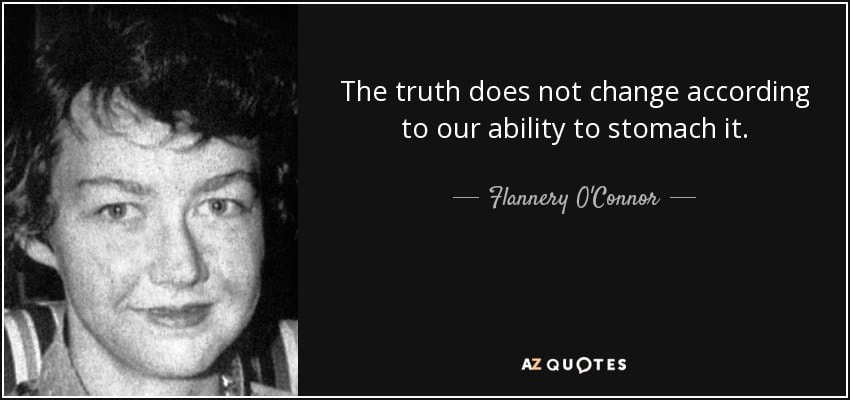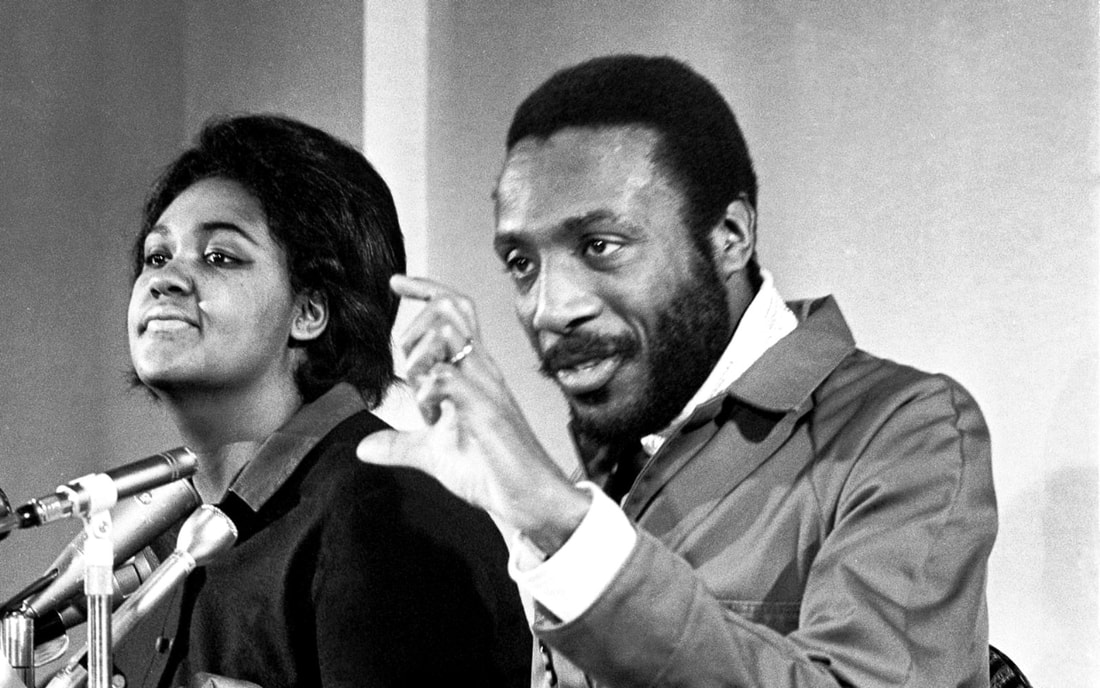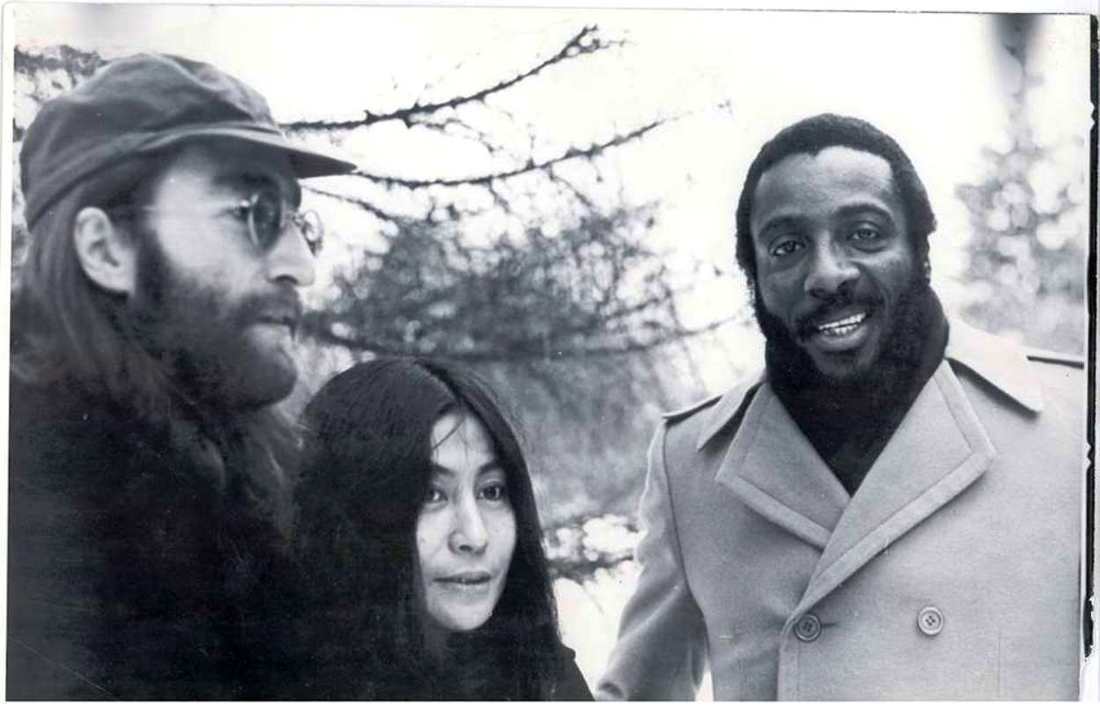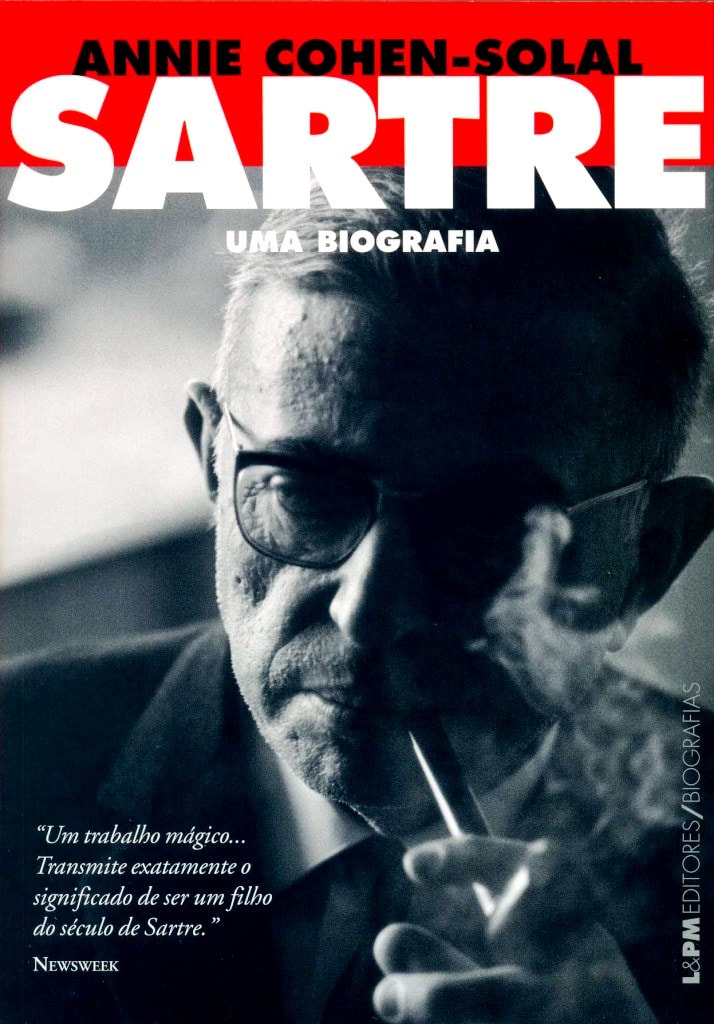|
Impaired as she was by lupus, O’Connor may not have been able to barrel ahead with the same level of prolific productivity as some of her contemporaries—such as James Baldwin for example-- but neither did she let it bring her career to a screeching halt between the time of her diagnosis and her death on August 3, 1964. She followed the novel Wise Blood with a collection of short stories, A Good Man is Hard to Find, in 1955; the novel The Violent Bear it Away in 1960; and the short story collection Everything That Rises Must Converge ––a book on which she worked virtually right up until her death–– published posthumously in 1965. In between the writing and the publishing, she marshaled her strength to travel (aided by crutches) and lecture, write articles for popular magazines (for which she was generally well paid), and write numerous letters to friends, supporters, and critics. (To read part 1 of this story please click here. For part 2 click this link.) The O’Connor readers and scholars now know would not have been possible without a tightly woven network of friends and family members who supported her work through belief in, and out of love for, her. After illness derailed her plans to live the life of a postmodern New York author, she famously surrounded herself with peacocks at Andalusia, her family’s farm, and allowed the world to come to her just as much as she continued to embrace it on the page and through speaking engagements. Fellow authors, theologians, aspiring writers, general admirers, and would-be lovers in the form of men as well as women often made their way to her front door.
Her editor, Robert Giroux, believed enough in the corpus of her work that in 1971 he published The Complete Stories of Flannery O’Connor. A compilation of all her short fiction, The Complete Stories went on to win the National Book Award for Fiction in 1972, and in 2009—shortly after Brad Gooch’s biography was published–– was voted “The Best of the National Book Awards Fiction.”
|
| | |
In Praise of Those Who Wait
Then, approached by an editor in 2003 about a biography on O’Connor, it clearly was not an offer he could refuse. A dream which had been deferred for more than two decades finally saw the light of day in 2009 and by most accounts it was very much worth the wait.
Author
Aberjhani is co-author of Encyclopedia of the Harlem Renaissance as well as author of Dreams of the Immortal City Savannah and Greeting Flannery O'Connor at the Back Door of My Mind.
| | |
To read part 1 of this article please CLICK HERE. Part 2 begins now:
In fact, the political component expressed in the pages of Nigger was not something in which publisher E.P Dutton, according to Gregory, was interested at all. As explained in conversation with the late Dr. Marable Manning (1950-2011, author of the biography Malcolm X, A Life of Reinvention) just before receiving the Hung Tao Choy Mei Leadership Institute's 2006 Paul Robeson "Here I Stand" award, the publisher expected the comic to deliver a manuscript showcasing his ethnic “wit and wisdom” with minimal focus on the racial realities of the time. What they wanted, essentially, was a joke book which left no room for expansions of consciousness.
However, having already received an advance of $200,000 for the proposed work, Gregory opted to partner with white author Robert Lipsyte to produce a book which could simultaneously: 1) help raise people’s awareness about the effects of racial disparity in the United States; 2) share humor based on the human condition as he lived it; and 3) inspire participation in the Civil Rights Movement. This unexpected gamble at first stunned both the publisher and the public but ultimately yielded across-the-board rewards for all stakeholders involved.
| | |
Partners in the Struggle
Sometime later, she took Gregory’s place on the front lines of a protest in Selma, Alabama. There, she was arrested and spent a week in jail while pregnant with twins.
Prophetic Inclinations
| | |
That specific aspect of his demeanor is particularly noticeable in chapter seven of Nigger . The section contains a transcript of his response to a startling discovery. Preparing to address activists gathered in a church in Selma to coordinate the registration of Black voters, Gregory observed that the front row of the church had been “filled that night with policemen pretending to be newspaper reporters and taking notes” (p. 200). Rather than becoming dismayed or frightened, he used this development to address the infiltrators directly:
“…What do you think would happen to Christ tonight if He arrived in this town a black man and wanted to register to vote on Monday? What do you think would happen? Would you be there? You would? Then how come you’re not out there with these kids, because He said that whatever happens to the least, happens to us all… Let’s analyze the situation…” (p. 202).
| | |
Getting Stronger
“Those of us who weren’t destroyed got stronger, got calluses on our souls. And now we’re ready to change a system, a system where a white man can destroy a black man with a single word. Nigger… When we’re through, Momma, there won’t be any niggers any more” (p. 209).
Although it appeared America had reached a kind of final goal when former POTUS Barack Obama occupied the White House for eight years, Gregory knew we had not. He nevertheless retained faith in the American people’s ability to one day achieve such a goal.Sitting on the sidelines and dreaming or complaining about it could never be enough to make it happen. An accomplishment of that magnitude would require––as demonstrated by his own amazing life example––an unwavering dedication combined with a willingness to make sometimes painful sacrifices, and, a sustained belief that ultimately the benefits of the long hard struggle will come to outweigh all untold anguish endured.
About Aberjhani
On any given day of the week, the creator of Postered Chromatic Poetics and co-author of Encyclopedia of the Harlem Renaissance, Aberjhani, may be found wearing any number of hats descriptive of multiple pursuits: historian, visual artist, poet, advocate for compassion, novelist, journalist, photographer, and editor. Having recently completed a book of creative nonfiction on his hometown of Savannah, Georgia (USA) he is currently working on a play about the implications of generational legacies as symbolized by efforts to rename the Eugene Talmadge Memorial Bridge.
| | |
Biography Presents Compelling Portrait of Life, Times, and Mind of Jean-Paul Sartre (part 2 of 2)
7/11/2017
To read part 1 of this article please click here.
In this, he was much more a world citizen, or internationalist, than a nationalist. Cohen-Solal demonstrates as much through accounts of his physical and psychic immersion into different cultural and political environments as a traveler, and through applied adjustments of his literary focus as an engaged philosopher. Referring to the aftermath of a 1945 trip to the United States:
“What Is Literature?, Anti-Semite and Jew, The Respectful Prostitute, these are some of Sartre’s works that in the months to come, deal with the reality he has discovered in America. His recent awareness of the black problem [Jim Crow racism] is enhanced by his friendship with the American writer Richard Wright, whose autobiographical novel, Black Boy, was published in March 1945” (Cohen-Solal, p. 242).
And, as philosopher and social justice advocate Cornel West points out in his introduction to the biography, despite any criticisms of the man:
“Sartre will always be remembered as the most visible and influential European intellectual who put a limelight on the struggles against U.S. and French imperialism in Africa and Asia and against white supremacy in the United Sates. This is no small matter and it took great courage to do so. His support of freedom struggles in Morocco, Algeria, Vietnam, Cuba, South Africa, and the United States—regardless of the outcomes that resulted—was heroic” (West, p. xviii).
In Closing
Author-Artist
Aberjhani is an American poet, historian, essayist, editor, journalist, social critic, and cautious artist. His many honors include the Choice Academic Title of the Year Award, the Notable Book of the Year Award, Outstanding Journalist Award, and Poet of the Year Award. He is currently completing final edits on a work of creative nonfiction about the cultural arts, race relations, immigration, and human trafficking in his hometown of Savannah, Georgia.
Archives
November 2023
June 2023
February 2023
December 2022
June 2022
February 2022
November 2021
September 2021
April 2021
March 2021
December 2019
November 2019
June 2019
May 2019
March 2019
January 2019
October 2017
July 2017
August 2012
Categories
All
1950s
1960s
2022 Russia Ukraine War
20th Century Authors
21st Century Artists
21st Century Authors
21st Century Poets
Aberjhani
Aberjhani Observance Of National Poetry Month
Aberjhani On Aurie Cole
Aberjhani On Brad Gooch
Aberjhani On Chinese Famine
Aberjhani On Dick Gregory
Aberjhani On Duncan McNaughton
Aberjhani On Eugene Talmadge
Aberjhani On Flannery O'Connor
Aberjhani On Immigration
Aberjhani On Jean-Paul Sartre
Aberjhani On Mao Zedong
Aberjhani On Mark Morneweg
Aberjhani On Maya Angelou
Aberjhani On Otis S. Johnson
Aberjhani On Paul Laurence Dunbar
Aberjhani On PT Armstrong
Aberjhani On Russia Ukraine Was
Aberjhani On Savannah Georgia
Aberjhani On Savannah-Georgia
Aberjhani On Yang Jisheng
Adapting Books For Film
Africa
African American Authors
African-American Authors
African-American Comics
African American History Month
African American Men
African-American Men
African Americans
African Americans Abroad
African Americans In Japan
African Americans Living Outside America
African American Writers In Savannah GA
African Diaspora
African Engineers
African Writers
AI Literary Chat Salon
Alice Walker
Amanda Gorman
American Artists
American Authors
American Civil War
American PEN Video
Andrew Davidson
Angel Art
Angel Lore
Angel Meme
Angel Of War And The Year 2022
Angelology
Annie Cohen-Solal
Antiracism
Archangel Michael
Art By Aberjhani
Art By Christia Cummings-Slack
Artist-Author Aberjhani
Artist James Russell May
Artist Marcus Kenney
Asian Authors
Audio Podcast
Aurie Cole
Author Brad Gooch
Author Connie Zweig
Author Franklin D. Lewis
Author Interview
Author Mark Morneweg
Author Poet Aberjhani Official Site
Author-Poet Aberjhani - Official Site
Authors
Authors From Savannah Georgia
Ava DuVernay
Benjamin Hollander
Benjamin Van Clark Neighborhood
Ben Okri
Ben Okri Videos
Best Interviews Of 2023
Bill Berkson
Biography
Biracial Relationships
Biracial Women
Black History Month
Black Men Who Write
Black Movie Directors
Black Women Authors
Blogs By Aberjhani
Booker Prize For Literature
Booker Prize Winners
Book Industry
Book Publishing
Book Reviews
Book Reviews By Aberjhani
Books
Books About Rumi
Books About Savannah-Georgia
Books About Sufism
Books And Authors
Books By Aurie Cole
Books By Darrell Gartrell
Books By Flannery O'Connor
Books By Patricia Ann West
Books By PT Armstrong
Books By Robert T.S. Mickles Sr.
Books By Rotimi Ogunjobi
Books On Flannery O'Connor
Brad Gooch
Brad Gooch Audio Podcast
Brunswick Georgia
Canadian Authors
Canadian Novelists
Carlos Ruiz Zafon
Caste The Origins Of Our Discontents
Celebrity Authors
Children's Literature
Chinese Authors
Chinese History
Christia Cummings-Slack
Christina Cummings-Slack
Christine Cummings
Classic Authors
Connie Zweig
Contemporary African Literature
Contemporary African Writers
Contemporary Artists
Contemporary Authors
Contemporary Canadian Authors
Contemporary Literature
Contemporary Southern Literature
Cormac Mccarthy
Cornel West
Creative Nonfiction
Creative Thinkers
Cultural Demographics
Cultural Heritage
David Gordon Green
Dick Gregory Videos
Digital Publishing
Director Regina King
Director Steve McQueen
Doctorate In Literature
Dreams Of The Immortal City Savannah Book By Aberjhani
Duncan McNaughton
Ebooks
Education
El Portal Press
English As A Second Language
English Learning Students
Essay On 21 Years Of Wisdom
Essays By Aberjhani
Essays On Ben Okri
Essays On Duncan McNaughton
Essays On Flannery O'Connor
Essays On Immigration
Eugene Talmadge
Eugene Talmadge Memorial Bridge
Evolving Cultures
Existential Creativity
Existentialism
Fall Of The Rebel Angels
Famous Women Artists
Fiction
Filming Movies In Savannah-Georgia
Flannery O'Connor
French Authors
French Literature
Genre Bending Literature
Genre-bending Literature
Global Community
Grandmothers
Great Sufi Poets
Greeting Flannery O'Connor At The Back Door Of Mind Book By Aberjhani
Gullah Geechee Culture
Gustave Flaubert
Halloween's End
Hector France
Historical Fiction
Historical Poetry
History
History Of Civil Rights Movement
History Of Famines
History Of Literature
History Of Racism
Human Cannibalism
Iconic Authors
Immigrant Experience
Immigration Policies
Influential Authors
International Authors
International Poets
Interracial Relationships
Interview
Isabel Wilkerson
Jalal Al-Din Mohammad Balkhi
Jalal Al Din Mohammad Rumi
Jalal Al-Din Mohammad Rumi
James Joyce
Jean Genet
Jean-Paul Sartre
Jelaluddin Rumi
Jim Crow Racism
Lady Gaga
Latino Ficiton
Leadership Philosophy
Leadership Theory
Life And Legacy Of Dick Gregory
Life And Legacy Of Flannery O'Connor
Lillian Gregory
Literary Biographies
Literary Community
Literary Criticism
Literary Essays
Literary Friendships
Literary History
Literary Honors
Literary Influencers
Literary Influences
Literary Legacies Of The South
Literary Prizes
Literary Traditions
Literary Translations
Literature Of Immigration
Luca Giordano
Memoir
Memoir By Darrell Gartrell
Michal Majernik
Movie Sets
Mythology
National Poetry Month
Naturalism Fiction
New Orleans
Nicanor Parra
Nigerian Authors
Nigerian Literature
Nigger By Dick Gregory
Nobel Laureates
Nonfiction
Novels
Official Site For Author Poet Aberjhani
Official Site For Author-Poet Aberjhani
Official Website Of Author Poet Aberjhani
Official Website Of Author-Poet Aberjhani
Oklahoma City
Oprah Winfrey
Patricia Ann West
PEN America
PEN International
Philosophy
Podcast On Literature
Poems About Savannah-Georgia
Poems By Patricia Ann West
Poetry
Poetry By Aurie Cole
Poetry By Duncan McNaughton
Poets Against War
Poets From
Poets From Afghanistan
Poets From Boston
Poets From Savannah Georgia
Poets From Savannah-Georgia
Poets On War
Political Activism
Political Biographies
Political Strategies
Political Theories
Postered Poetics Art By Aberjhani
Predatory Gentrification
Preventing Erasures Of History
Prose And Poetry
Prose Poem
Public Intellectuals
Public School System
Publishers
Publishing
Publishing Options
Putin Attacks Ukraine
Q&A With Author
QOTD Quote Of The Day
Quentin Tarantino
Quotations
Quotes By Dick Gregory
Quotes By Flannery O'Connor
Quotes By Mark Morneweg
Race In America
Race In Japan
Racism In Georgia
Racism In Savannah
Racism In The United States
Reiki Master
Richard Wright
Rotimi Ogunjobi
Rumi's Birthday
Russian Invasion Of Ukraine
Russia Ukraine Conflict 2022
Russia Ukraine Video
Russia Ukraine War
Salman Rushdie
Sandfly In Savannah Georgia
San Francisco Poets
Savannah College Of Art And Design Graduates
Savannah Georgia
Savannah-Georgia
Savannah River
Savannah State University
SCAD Graduates
Singer Sade
Social Activism
Social Realism
Somewhere In The Stream By Duncan McNaughton
South Carolina
Southern Legacies
Spike Lee
Spiritual Counseling
Spirituality
Starvation
Still Water Words
Sufi Literature
Talks Between My Pen And Muse
Teachable Take-Aways
Text And Meaning Series By Aberjhani
The American Poet Who Went Home Again
The Angel's Game
The Famished Road
The Gargoyle By Andrew Davidson
The River Of Winged Dreams
The Word "Nigger"
Toni Morrison
Transgression Fiction
Transgression Literature
Transgressive Literature
Tribute To Dick Gregory
Ukraine Russia Crisis 2022
Video
Video Podcast
Video Poem
Videos About Rumi
Videos On Literature
Wakanda Forever
War And Peace
William Anderson
Wisdom21
Women Artists
Women Authors
Women Poets
Women's Voices
World Community
World History
World Poetry Day
Writers And Writing
Xenophobia
Yang Jisheng
Year 2022 In Review
Yoko Ono
YouTube Videos





 RSS Feed
RSS Feed